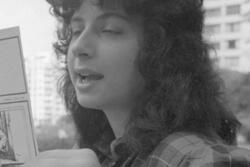Why I'm Resistant To All Things Pink In October
Dr. Judith Rosenbaum, Director of Public History at the Jewish Women's Archive and lead developer of Living the Legacy educational materials, first wrote this piece for Role/Reboot. There you can read the piece in its entirety.
Though I’ve never had breast cancer, I think it’s fair to say the disease has shaped my life. My mother was diagnosed at age 32, when I was 5 years old; she battled the disease for 33 years before dying of her sixth recurrence last December. Four years ago, I learned that I carry the BRCA genetic mutation, and I chose to have two prophylactic surgeries—bilateral mastectomy and the removal of my ovaries and fallopian tubes—taking drastic action in order to reduce my risk of breast cancer and ovarian cancer.
So one might think I’d spend the month of October festooned with pink ribbons, buying up pink products, marching through the streets in a “Save the Ta-Tas” t-shirt, to raise awareness of this disease that has haunted me for nearly 35 years. But the truth is: I’m emphatically pink-resistant.
“Awareness” is…well, it’s certainly better than ignorance. But it’s so abstract. What kind of awareness does this month really spark? Awareness that women get sick and sometimes lose their breasts? Awareness of breast cancer’s environmental causes? Awareness of the political, racial, and economic inequities that are part of this disease and its treatment? Awareness of the fact that some of the biggest marketers of pink products benefit financially from breast cancer and/or pollute the environment with carcinogenic toxins?








I am a current cancer patient. I have metastatic breast cancer that has gone to the brain and now the liver. I have been battling this for 6 yrs. now and it looks like I might not beat it. I wear one pink bracelet, but not because it's pink, but because it says the word "strength". It's a rubber bracelet so I've been able to wear it for tests and surgeries to remind myself that I'm stronger than I may be feeling right at that moment. As far as the awareness stuff goes, most people are already aware that breast cancer exists and products are allowed to print that on their pink products without donating any proceeds to cancer research. Plus there's a lot of funds going into breast cancer research but hardly any going into metastatic research. The survival rate of a woman who gets breast cancer today is high unless you have metastatic breast cancer which reduces your chance of survival drastically. Most people who are living with breast cancer don't need anything pink to remind them that it exists.
Judith writes, Ì¢âÂÒAwareness isnÌ¢âÂã¢t enough.Ì¢âÂå
And yet Ì¢âÂå_ itÌ¢âÂã¢s a start.
I was at a football game last weekend in central Maine, the last game of the season between crosstown rivals. About halfway through the first quarter, I noticed that Ì¢âÂÒourÌ¢âÂå team members were all wearing pink socks. Then I saw that Ì¢âÂÒtheirÌ¢âÂå team was doing the same. Cheerleaders for both sides sported pink hair ribbons. I asked a local parent if it was for Breast Cancer Awareness Month. When she confirmed my supposition, I told her, Ì¢âÂÒThat would never have happened at my high school.Ì¢âÂå
In the late Ì¢âÂèÏ60s, you would never get football players to wear pink socks; I donÌ¢âÂã¢t care who you were. The jocks (Ì¢âÂÒtheirÌ¢âÂå group) cut their hair short and wore team jackets; Ì¢âÂÒmyÌ¢âÂå group wore our hair long and preferred bellbottoms. The fashions were walking statements of beliefs and priorities: Ì¢âÂÒtheyÌ¢âÂå were with the established order and waved the flag, Ì¢âÂåweÌ¢âÂå questioned authority and marched in anti-war protests. The fashion then did seem to reflect both beliefs and actions of the opposing sides.
Times have certainly changed, and fashion now seems to me a grab-bag fusion of colors and shapes that can be combined in endless permutations without necessarily having to say anything. But the Maine cheerleaders performed together at the half, shaking their hair ribbons in time with each other, and the opposing teams met after the game in the middle of the field to shake hands with each other, each hulking player wearing their pink socks. In their fashion, perhaps they all had more awareness than they had before the month began.
May it be that this generation finds more targeted solutions, more humane treatments, or even a cure for breast cancer? May one or more of those young people on the field be a part of that wondrous day? All I know is they are already decades ahead of where we were, and that the Ì¢âÂÒlife-affirming, life-sustaining, loud and insistent actionÌ¢âÂå Judith calls for in her post may have already begun, in a small way, on a field in Maine. You have to start somewhere.